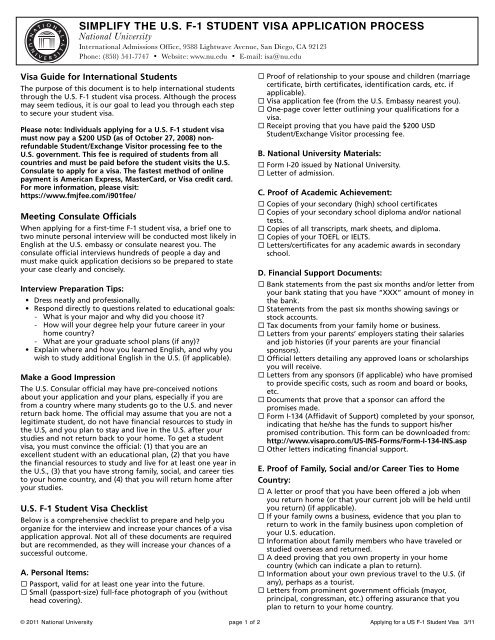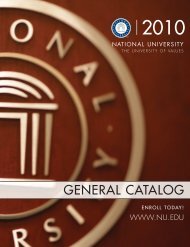simplify the us f-1 student visa application process - National ...
simplify the us f-1 student visa application process - National ...
simplify the us f-1 student visa application process - National ...
Create successful ePaper yourself
Turn your PDF publications into a flip-book with our unique Google optimized e-Paper software.
Simplify <strong>the</strong> U.S. f-1 StUdent ViSa <strong>application</strong> proceSS<strong>National</strong> UniversityInternational Admissions Office, 9388 Lightwave Avenue, San Diego, CA 92123Phone: (858) 541-7747 • Website: www.nu.edu • E-mail: isa@nu.eduVisa Guide for International StudentsThe purpose of this document is to help international <strong>student</strong>sthrough <strong>the</strong> U.S. F-1 <strong>student</strong> <strong>visa</strong> <strong>process</strong>. Although <strong>the</strong> <strong>process</strong>may seem tedio<strong>us</strong>, it is our goal to lead you through each stepto secure your <strong>student</strong> <strong>visa</strong>.Please note: Individuals applying for a U.S. F-1 <strong>student</strong> <strong>visa</strong>m<strong>us</strong>t now pay a $200 USD (as of October 27, 2008) nonrefundableStudent/Exchange Visitor <strong>process</strong>ing fee to <strong>the</strong>U.S. government. This fee is required of <strong>student</strong>s from allcountries and m<strong>us</strong>t be paid before <strong>the</strong> <strong>student</strong> visits <strong>the</strong> U.S.Consulate to apply for a <strong>visa</strong>. The fastest method of onlinepayment is American Express, MasterCard, or Visa credit card.For more information, please visit:https://www.fmjfee.com/i901fee/Meeting Consulate OfficialsWhen applying for a first-time F-1 <strong>student</strong> <strong>visa</strong>, a brief one totwo minute personal interview will be conducted most likely inEnglish at <strong>the</strong> U.S. embassy or consulate nearest you. Theconsulate official interviews hundreds of people a day andm<strong>us</strong>t make quick <strong>application</strong> decisions so be prepared to stateyour case clearly and concisely.Interview Preparation Tips:• Dress neatly and professionally.• Respond directly to questions related to educational goals:- What is your major and why did you choose it?- How will your degree help your future career in yourhome country?- What are your graduate school plans (if any)?• Explain where and how you learned English, and why youwish to study additional English in <strong>the</strong> U.S. (if applicable).Make a Good ImpressionThe U.S. Consular official may have pre-conceived notionsabout your <strong>application</strong> and your plans, especially if you arefrom a country where many <strong>student</strong>s go to <strong>the</strong> U.S. and neverreturn back home. The official may assume that you are not alegitimate <strong>student</strong>, do not have financial resources to study in<strong>the</strong> U.S, and you plan to stay and live in <strong>the</strong> U.S. after yourstudies and not return back to your home. To get a <strong>student</strong><strong>visa</strong>, you m<strong>us</strong>t convince <strong>the</strong> official: (1) that you are anexcellent <strong>student</strong> with an educational plan, (2) that you have<strong>the</strong> financial resources to study and live for at least one year in<strong>the</strong> U.S., (3) that you have strong family, social, and career tiesto your home country, and (4) that you will return home afteryour studies.U.S. F-1 Student Visa ChecklistBelow is a comprehensive checklist to prepare and help youorganize for <strong>the</strong> interview and increase your chances of a <strong>visa</strong><strong>application</strong> approval. Not all of <strong>the</strong>se documents are requiredbut are recommended, as <strong>the</strong>y will increase your chances of asuccessful outcome.A. Personal Items: Passport, valid for at least one year into <strong>the</strong> future. Small (passport-size) full-face photograph of you (withou<strong>the</strong>ad covering). Proof of relationship to your spo<strong>us</strong>e and children (marriagecertificate, birth certificates, identification cards, etc. ifapplicable). Visa <strong>application</strong> fee (from <strong>the</strong> U.S. Embassy nearest you). One-page cover letter outlining your qualifications for a<strong>visa</strong>. Receipt proving that you have paid <strong>the</strong> $200 USDStudent/Exchange Visitor <strong>process</strong>ing fee.B. <strong>National</strong> University Materials: Form I-20 issued by <strong>National</strong> University. Letter of admission.C. Proof of Academic Achievement: Copies of your secondary (high) school certificates Copies of your secondary school diploma and/or nationaltests. Copies of all transcripts, mark sheets, and diploma. Copies of your TOEFL or IELTS. Letters/certificates for any academic awards in secondaryschool.D. Financial Support Documents: Bank statements from <strong>the</strong> past six months and/or letter fromyour bank stating that you have “XXX” amount of money in<strong>the</strong> bank. Statements from <strong>the</strong> past six months showing savings orstock accounts. Tax documents from your family home or b<strong>us</strong>iness. Letters from your parents’ employers stating <strong>the</strong>ir salariesand job histories (if your parents are your financialsponsors). Official letters detailing any approved loans or scholarshipsyou will receive. Letters from any sponsors (if applicable) who have promisedto provide specific costs, such as room and board or books,etc. Documents that prove that a sponsor can afford <strong>the</strong>promises made. Form I-134 (Affidavit of Support) completed by your sponsor,indicating that he/she has <strong>the</strong> funds to support his/herpromised contribution. This form can be downloaded from:http://www.<strong>visa</strong>pro.com/US-INS-Forms/Form-I-134-INS.asp O<strong>the</strong>r letters indicating financial support.E. Proof of Family, Social and/or Career Ties to HomeCountry: A letter or proof that you have been offered a job whenyou return home (or that your current job will be held untilyou return) (if applicable). If your family owns a b<strong>us</strong>iness, evidence that you plan toreturn to work in <strong>the</strong> family b<strong>us</strong>iness upon completion ofyour U.S. education. Information about family members who have traveled orstudied overseas and returned. A deed proving that you own property in your homecountry (which can indicate a plan to return). Information about your own previo<strong>us</strong> travel to <strong>the</strong> U.S. (ifany), perhaps as a tourist. Letters from prominent government officials (mayor,principal, congressman, etc.) offering assurance that youplan to return to your home country.© 2011 <strong>National</strong> University page 1 of 2 Applying for a US F-1 Student Visa 3/11
F. Completed U.S. Government Forms:One of <strong>the</strong>se two nonimmigrant <strong>application</strong> forms: A DS-156 form (Nonimmigrant Application Form), withphoto of each applicant. For date of arrival (#22), please <strong>us</strong>e<strong>the</strong> date from Item 5 of your I-20 form.Or A DS-160 Online (Nonimmigrant Visa ElectronicApplication): The DS-160 replaces <strong>the</strong> current NonimmigrantApplication Form DS-156 and will be phased in during thisyear, 2011. Not all U.S. embassies and consulates abroad willbe required to <strong>us</strong>e <strong>the</strong> form at <strong>the</strong> same time. For males, a DS-157 form. A DS-158 form that lists your past work history. A receipt proving that you have paid <strong>the</strong> $200 USDStudent/Exchange Visitor <strong>process</strong>ing fee.Organizing MaterialsBelow is a suggested order of how to organize yourdocuments for <strong>the</strong> interview:1) Cover Letter.2) <strong>National</strong> University Form I-20.3) <strong>National</strong> University acceptance letter.4) Copies of your secondary (high) school certificates.5) Copies of your secondary school diploma and/ornational tests.6) Copies of your TOEFL or IELTS.7) Academic Award Letters.8) Bank statements (for <strong>the</strong> past six months) and/or letterfrom your bank stating that you have “XXX” amount ofmoney in <strong>the</strong> bank.9) Letters from your parents’ employers stating <strong>the</strong>irsalaries and job histories (if your parents are yourfinancial sponsors).10) Official letters detailing any approved loans orscholarships you will receive.11) Letters from sponsors.12) Letters indicating financial support.13) Evidence of any property that you own in your homecountry (if applicable).14) Letter from your employer saying that you have a jobto return to upon completion of your degree (ifpossible).15) Evidence that you have family remaining in yourcountry and that you plan to return.16) Evidence that you have left your home country andreturned.17) Letters from prominent government officials.18) Passport.Application Process Tips• Don’t wait until <strong>the</strong> last minute! Apply for your F-1<strong>student</strong> <strong>visa</strong> as early as possible--up to four months beforeyou plan to begin your studies, if possible.• Allow several weeks for getting an appointment and a<strong>visa</strong>. Call <strong>the</strong> U.S. embassy or consulate nearest you, or goto <strong>the</strong> embassy website for information and instructions.You m<strong>us</strong>t complete several forms before your interview,and <strong>the</strong> embassy may want to verify <strong>the</strong> information yougive.• To attend <strong>National</strong> University, you m<strong>us</strong>t <strong>us</strong>e <strong>the</strong> <strong>National</strong>University I-20 form. If you apply to several schools, youm<strong>us</strong>t get an I-20 from each school.Academic Preparation for English LanguageStudiesIf you plan to take English Language classes at <strong>National</strong>University, be prepared to directly answer <strong>the</strong> followingquestions:• How will you <strong>us</strong>e English after you return home?• Why is it <strong>us</strong>eful or important for you to know English?• What will you study?• Why do you need English for that field?Presented here is sample dialogue that can be improvisedwhen speaking with <strong>the</strong> official:• “English will help me with my career plans.”• “In my field of study, research papers are published inEnglish and conferences are led in English. “• “It is faster and more efficient to learn English while livingin an English-speaking culture.”• “Language learning includes cultural education.Interacting with native speakers outside <strong>the</strong> classroom isvery helpful.”• “Immersion in a language is <strong>the</strong> fastest way to learn it.”Presented here is sample dialogue to avoid when speakingwith <strong>the</strong> official:• ”I want to study in <strong>the</strong> U.S. beca<strong>us</strong>e my friends are here.”• ”I like American movies.”What If Your Visa Is Denied?When a <strong>visa</strong> request is denied, <strong>the</strong> main reason (90 percent ofdenials) is that <strong>the</strong> official believes <strong>the</strong> <strong>student</strong> actually wantsto go to <strong>the</strong> U.S. to live and work permanently. Ask politelyfor a denial reason and if additional documentation couldresult in an approval. If so, what documents would be most<strong>us</strong>eful?You can re-apply, but you need to show more evidence youwill return home after study and that you have sufficientfunds to pay for your educational expenses. You may need toexplain clearly and politely how your situation has changedsince your earlier request. Use additional documents andinformation to prove to <strong>the</strong> official that what you say is true.Every situation is different. Think again about your ties to yourhome country and your checklist. Reexamine familyrelationships, jobs, family ownership of homes, b<strong>us</strong>inesses, orland. Do you have o<strong>the</strong>r evidence to present? Perhaps revisityour first interview and ask for a second one.If you are denied a <strong>visa</strong> a second time, you will have to waitfor a period before you return. However, <strong>the</strong> probability ofsuccess on a third try is not very high. Each time you apply,your chances diminish. You need to provide moredocumentation so that you can say truthfully that <strong>the</strong>re arenew facts to review and more reason for approval.<strong>National</strong> University believes in offering premier educationalopportunities to <strong>student</strong>s worldwide. We hope this guide hasproven <strong>us</strong>eful to you on your academic journey.Website for U.S. embassies and consulates worldwide:http://<strong>us</strong>embassy.state.gov/Website for <strong>student</strong> <strong>visa</strong> <strong>application</strong>s and information:http://www.travel.state.gov/<strong>visa</strong>/temp/types/types_1268.html© 2011 <strong>National</strong> University page 2 of 2 Applying for a US F-1 Student Visa 3/11
















